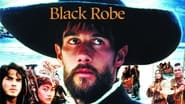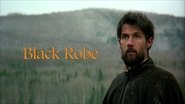AMar_rom
'The English and the Dutch have colonists, we have priests' we hear a French militia man saying in the beginning of the film set sometime in 1630s at a French outpost somewhere in Quebec, Canada. The priest who is seen walking past the militiamen and construction workers is father Laforgue (played by Lothaire Bluteau; a great performance). Laforgue is a young Jesuit sent from France to the New World to convert the Hurons and other indigenous tribes that lived once in large areas of Canada and the northern states of the US.To aid Laforgue in his mission the local French authorities ask a group of Hurons (allies of the French at the time) to accompany him until he reaches a Jesuit-controlled mission much deeper in Quebec. During the trip of the group we see past moments of the life that Laforgue left behind in France (through a number of flashbacks) before deciding to commit himself to such a task in the New World. The trip is dangerous. We learn that except the actual hardships of the trip the Hurons will try to avoid the Iroquois (at least other tribes of the Iroquois nation, since the Hurons were part of the great Iroquois nation) and the English who have started to become more powerful than the French in the region.Soon, however, friction begins. For the Hurons (a traditional pagan society with Shamans acting as the intermediaries with the spirits) the Christian message of Laforgue 'love your neighbor' will mean certain death to the hands of the Iroquois. Therefore, they view father Laforgue with suspicion, even hatred after a while believing that he is a demon (especially after he demonstrates to them the reading of a book, a fact that unsettles them) and they start to wonder if it is worthwhile to risk too much for a person who promises them a paradise in an afterlife after death.'Black Robe' is a very interesting film but I think it is not for everyone. To start with it is not entertaining, it is not epic. There is no 'payback' for this mission that Laforgue undertakes. Despite the idyllic scenery of the New World the trip is very hard and demanding and the eventual conflict with the Iroquois is very harsh. Laforgue, nonetheless is a brave man and perseveres. His conviction to introduce Christianity to the Hurons and convert them is too strong and gives him the courage to go on. The question is if it was worthwhile. The movie cleverly avoids taking sides on this matter. I believe this is the big question that the movie asks and there is no easy answer. A 9/10 from me.
Boba_Fett1138
Perhaps you could say that this movie suffers from the fact that the movie "The Mission" got released 5 years earlier. Both movies feature a similar concept, with as a big difference that "The Mission" had more star-power behind it. But is it better or worse than "The Mission"? In my opinion there isn't all that much difference, though "The Mission" still remains a slightly better movie due to all of its professionalism involved.I'm of course not saying that this movie isn't a professional one. It really is a very well made movie, that is good looking and told in a good and intriguing. I just have to say that religion isn't exactly my cup of tea, so the main subjects of the movie just didn't really appeal to me, though the movie still worked out as something interesting enough for me.Thing that makes this movie interesting is its cultural clash, between the and the Jesuit priests and the Canadian Indians. Sometimes their difference lead to something good and they start learning from each other but mostly it leads to something ugly and violent. The movie does hold back a bit though at times, no doubt because otherwise the Indian community would had felt angered and offended by the way they got depicted in this movie. It doesn't make the whole movie experience any less interesting or good to watch though. It basically is being a respectful movie to both sides, by showing everything from the two opposite sides. It helps to create an understanding for both of the sides as well, which makes you condemn no one either. You can understand both sides and all of their motivations and actions, whether you agree with them or not.It was interesting to see this movie taking place in Canada, instead of America or somewhere in the Rainforest. Canada has a totally different feeling and look to it, which works out as something refreshing and also beautiful to look at. The natural environments are all great looking and get beautifully brought to the screen by director Bruce Beresford and cinematographer Peter James.Another things that adds to the atmosphere of the movie is the musical score by Georges Delerue, that works out as something haunting and beautiful for the movie.It really is a quite intriguing movie to watch, even when you really aren't into its subject.7/10 http://bobafett1138.blogspot.com/
Michael Neumann
A young French Jesuit priest journeys west into the New World in the early 17th century, facing all the usual challenges of the primeval wilderness: savage natives, inclement weather, and so forth. The similarities to 'Dances With Wolves', released two years earlier, are hard to ignore, not least in the way both films reduce complex historical issues of cultural dislocation to a grade school picture book level, throwing the White and Red man together against a background of (in this instance) breathtaking Autumn and Winter scenery. But unlike Kevin Costner's more commercial prairie epic, the newer film favors grim authenticity over audience-friendly hindsight. And without even a leading man of Costner's crowd-pleasing appeal it becomes little more than a handsome but depressing history lesson, not exactly a winning combination at the box office. Lothaire Bluteau is no less beatific in the title role than he was as 'Jesus of Montreal', and director Bruce Beresford seems determined to continue making shallow, issue-oriented entertainment ('Driving Miss Daisy', 'Mr. Johnson') for audiences without much real interest in the issues.
n-mo
Brian Moore grew up in Northern Ireland and considered joining the priesthood before he moved to Canada and abandoned his Catholic religion later in life. I've not read this nor any of his other novels, but I am told that on several occasions he explored the idea of a priest losing his faith, and I wonder if perhaps, in spite of his outward angst against the Irish clergy, he wasn't in fact (like so many ex-Christian writers) struggling to cast of his guilt and to justify abandoning his own vocation.In "Black Robe," for which Moore wrote the script as well as the book, he has chosen not to inject overtly anti-clerical themes. Perhaps he preferred to let the times speak for themselves: the French clergy in North America did most certainly believe in their mission to convert the Natives to Christianity, and no one believed in any sort of philosophical or cultural relativism. To the modern, deracinated and denatured man, this is offensive in and of itself and there would be no need to add the demonising of clerics so ubiquitous to contemporary cinema.But to those who dare question the modern liberal conscience, this film is done accurately enough to sympathise with and appreciate the Jesuit's mission. The French are portrayed as sympathetic but imperfect: the clerics are naïve and occasionally condescending in their dealings with the Natives, but as we watch their efforts unfold Moore, whether he meant to or not, shows that they truly wanted and tried to understand and relate to these poor souls they ministered to.And to pray for the salvation of these "poor, savage souls" was hardly condescending, and not only from a Catholic standpoint. For the Natives, life was short, violent and fearsome; death was always around the corner. Their religious beliefs were tightly wound with their daily routine and way of life (as they are in all pre-"Enlightened" societies, including those of Europe and European North America) and with life so tenebrous they feared anything innovative would completely destroy them. "We have accepted the gifts of the French, and we have come to depend on them. That will be the end of us." This is evident in Chomina's gradual coming to grips with Christianity and with the Abbé Laforgue (known to the Natives as "Black Robe"), but his unwillingness to let go and accept Baptism even on his deathbed. The Huron sense that the transformative power of the Baptismal water is so profound that they will "cease to be Huron," that their enemies, the Iroquois, will sense their weakness and destroy them.And yet, Moore has so successfully replicated the brutish world of the Native American that the viewer who can overcome modern Political Correctness will indeed find himself wishing not for their destruction but that they and their enemies could, in one sense, cease to be Huron, cease to be Iroquois, for their own sake and for each other's, before it is too late! And they, too, understand this: as Abbé Laforgue reminds his young companion, "These people are gifted with intelligence." It is significant that Abbé Laforgue himself is perceptive enough to realise that fact, even though their intelligence is one that he can never understand. The movie ends on an apparently hopeful note and then reveals--through text--something utterly depressing about the near future, reflecting perhaps Moore's reluctance to show a happy triumphant Christian ending. But Moore neglects to tell us the complete story or to allow us to see hints of the ultimate triumph.Romanticists will be sorely disappointed by "Black Robe," demolishing as it does that nice little myth of the Noble Savage, which has never amounted to anything more than a childish fairy tale. Leftists, too, many not appreciate it, for though it depicts the characters from their own and from each other's perspectives, the reality is that pre-colonial Native American culture was often excruciatingly cruel: as Chomina himself confesses, he is as selfish and sinful as any white man. There is neither postmodern white guilt complex here, nor the crass Cowboy and Indian games of old Westerners. In fact, there is very little in this film with which to sympathise from the standpoint of the modern "Enlightened" liberal conscience, and thank God for that! At last we have a movie about real human beings defined by their own time. The cinematography, moreover, is stunning: one truly feels the profoundity of the loneliness in the vast empty continent of North America. One complaint, though: if Moore went to this much trouble to portray the Natives speaking their own languages and Abbé Laforgue praying in Latin, couldn't the French have spoken to each other in FRENCH and not English??




